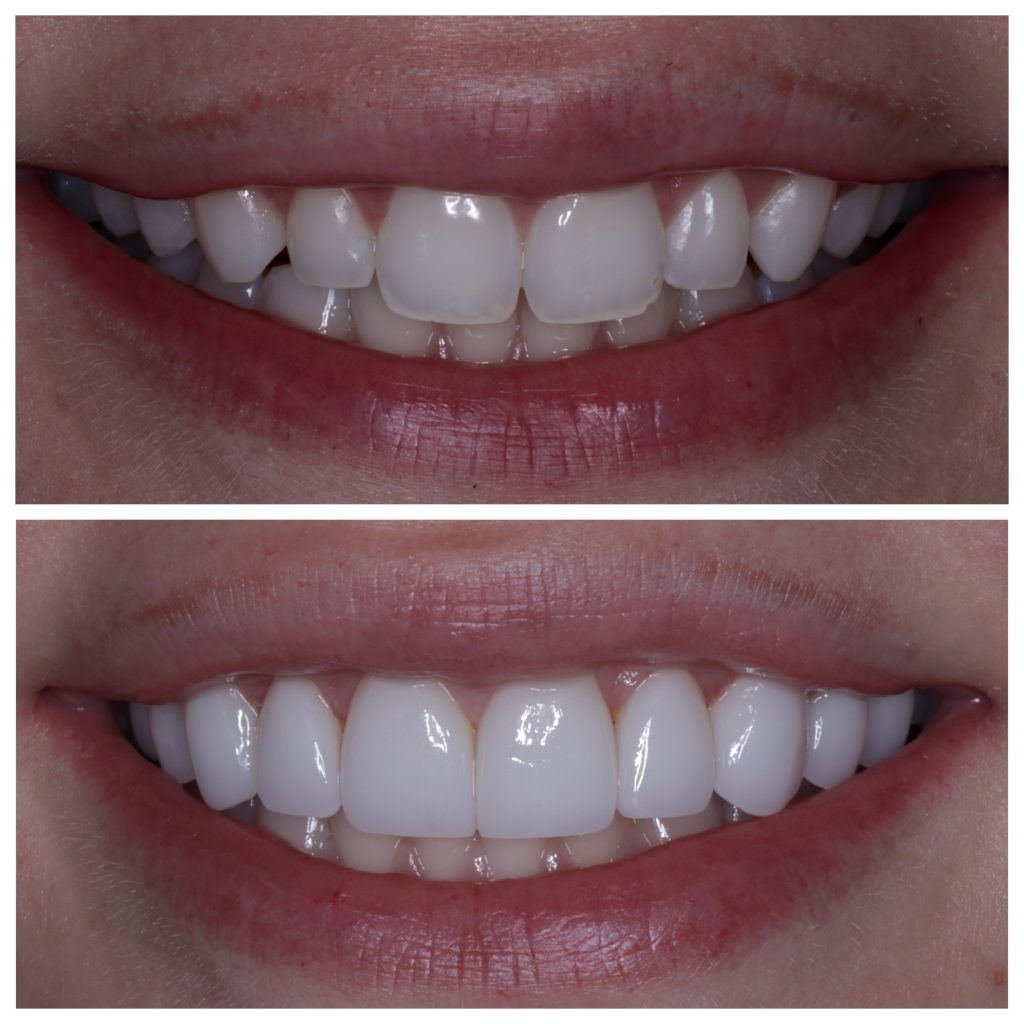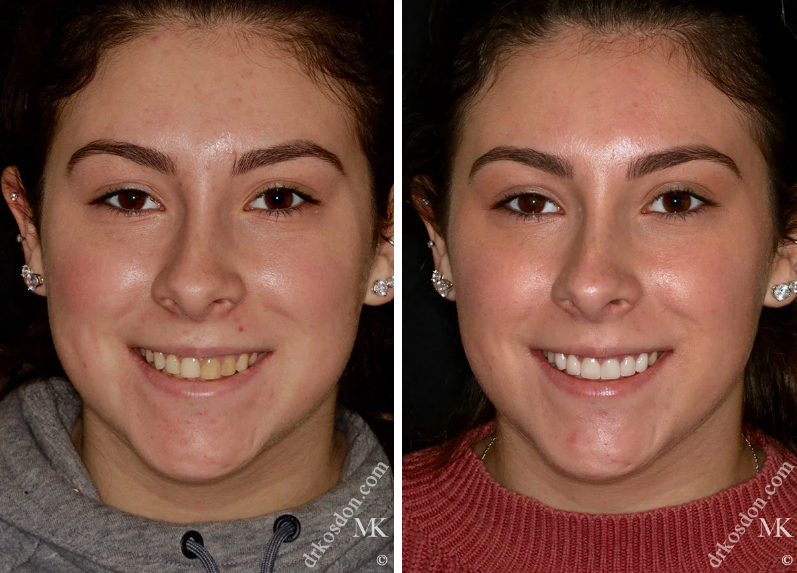Opening the Secrets of Veneers: Realities, Kinds, and Benefits for a Beautiful Smile
Veneers supply an engaging option for those looking for to improve their smiles. These dental improvements can attend to different blemishes, from discoloration to misalignment. With options like porcelain and composite, people can choose based upon their choices and needs. Understanding the subtleties of veneers, consisting of application and treatment, is essential. What variables should one think about prior to deciding? The answers might shock those interested in this aesthetic oral option.

Recognizing Veneers: What Are They?
Veneers are thin, custom-made shells created to cover the front surface area of teeth, enhancing their look. Commonly crafted from sturdy products, these shells are tailored to fit each individual's teeth precisely. They serve multiple purposes, including fixing visual flaws such as discoloration, chips, or voids. The application process includes a dental practitioner preparing the teeth, usually by eliminating a percentage of enamel to guarantee a tight fit. As soon as prepared, the veneers are adhered to the teeth utilizing a strong adhesive.
Patients frequently select veneers for their capability to create a natural-looking smile while giving a long-lasting service to dental blemishes. Unlike other aesthetic dental care options, veneers require minimal invasive procedures, making them a popular option. The result is an improved smile that can greatly boost a person's self-confidence and self-confidence. Overall, veneers use an efficient strategy to achieving an extra appealing and unified oral look.
Kinds of Veneers: Porcelain vs. Compound
When considering cosmetic oral options, two key sorts of veneers attract attention: porcelain and composite. Porcelain veneers are crafted from a sturdy ceramic product that imitates the natural appearance of teeth. They are understood for their stain resistance and capability to reflect light likewise to natural enamel, providing a visual appeal that lots of patients desire. The application procedure typically entails more prep work of the tooth framework and may need several check outs to the dental practitioner.
On the other hand, composite veneers are made from a tooth-colored material that is directly used to the teeth. This kind enables for quicker application and can often be finished in a solitary browse through. While they are less costly than porcelain veneers, they might not use the very same durability or resistance to staining. Ultimately, the choice between porcelain and composite veneers relies on individual preferences, budget, and certain dental needs.
The Benefits of Picking Veneers
Selecting veneers offers countless benefits that can significantly boost both the aesthetics and functionality of a person's smile. Among the primary benefits is their capability to deal with flaws such as staining, spaces, and imbalance, leading to a more uniform appearance. Veneers can likewise enhance the durability of teeth, offering a protective layer that guards them from damage.
In addition, they need marginal tooth prep work compared to other dental procedures, protecting even more of the natural tooth structure. This conservation contributes to a healthier oral atmosphere while still attaining a magnificent smile.
Veneers are highly personalized, allowing individuals to choose the shape, size, and shade that ideal matches their preferences. Furthermore, they are stain-resistant, making it less complicated to keep a attractive and brilliant smile over time. On the whole, veneers provide an efficient choice for those looking for both cosmetic improvement and long-term oral wellness benefits.
The Veneer Application Refine
The veneer application procedure entails a number of vital steps to assure excellent results. At first, an appointment is performed to evaluate the individual's requirements, followed by the preparation and shaping of the teeth. Lastly, the veneers are bound in position, with adjustments made for a perfect fit and look.
First Appointment Tips
A comprehensive first consultation is essential for any individual taking into consideration veneers, as it establishes the structure for an effective treatment. During this conference, the dental specialist assesses the person's dental wellness, discussing any type of existing problems that might influence the veneer application. This assessment might include X-rays and an aesthetic assessment to figure out the problem of the teeth and gum tissues.
The dental professional additionally involves the individual in an in-depth discussion concerning their visual objectives, choices, and expectations. They may provide various veneer alternatives tailored to the person's particular requirements. In addition, the professional clarifies the treatment, potential dangers, and aftercare demands, making sure that the patient is educated and comfy prior to proceeding with the treatment.
Preparation and Forming Teeth
After the first examination, the following phase involves the prep work and shaping of the teeth to fit the veneers. This important action is done by the dentist, that very carefully examines the tooth framework to identify the quantity of enamel that needs to be gotten rid of. Commonly, a slim layer, generally around 0.5 millimeters, is cut off to guarantee a proper fit for the veneers. Precision is paramount throughout this procedure, as it influences both the aesthetic result and the total comfort. As soon as the teeth are properly shaped, perceptions are taken to produce customized veneers that align completely with the patient's dental account. This meticulous preparation establishes the stage for a successful veneer application, enhancing both look and feature.
Bonding and Last Adjustments
Following the shaping and preparation of the teeth, the bonding procedure starts, noting a critical phase in the veneer application. Throughout this stage, a dental adhesive is related to the ready tooth surface Porcelain Veneers Dentist area, guaranteeing a solid bond between the veneer and the tooth. The dental practitioner carefully places the veneer, making adjustments to accomplish the wanted alignment and looks. As soon as correctly put, an unique light is used to treat the sticky, strengthening the bond. After healing, the dental professional carries out last changes, trimming any excess material and fine-tuning the veneer's shape to guarantee an all-natural look. This mindful focus to information boosts both feature and visual appeals, contributing to a total gorgeous smile that is resilient and durable.
Taking care of Your Veneers: Upkeep Tips
Taking care of veneers is necessary to maintain their look and durability. A constant everyday cleaning routine, mindful evasion of tarnishing foods, and normal oral exams are crucial elements of efficient maintenance. These practices help guarantee that veneers continue to be in peak problem and proceed to improve one's smile.
Daily Cleaning Regimen
Frequently preserving veneers is vital for their durability and look. A correct everyday cleaning regimen can assist preserve their shine and prevent damages. Dental practitioners suggest brushing two times a day with a soft-bristled tooth brush and fluoride toothpaste, guaranteeing that all surface areas are cleaned up gently to stay clear of scraping the veneer surface. Flossing day-to-day is likewise vital to get rid of food bits and plaque from between teeth, where brushes might not reach. In addition, making use of an antimicrobial mouth wash can aid preserve oral hygiene without damaging the veneers. It is suggested to prevent rough cleansers and tools that can scratch the veneer. By complying with these easy actions, individuals can maintain their veneers looking gorgeous while advertising overall dental health.
Staying Clear Of Staining Foods
Veneers are developed to boost the appearance of teeth, their vulnerability to tarnishing necessitates mindful nutritional choices. It is essential for individuals with veneers to be conscious of particular foods and beverages that can cause staining. Dark-colored things such as coffee, red white wine, and berry juices must be consumed in small amounts, as they are recognized to stain both natural teeth and veneers. Furthermore, acidic foods like citrus fruits container damage the bonding agents used in veneers, making them much more susceptible to discoloration. To preserve a brilliant smile, it is suggested to rinse the mouth with water after consuming staining foods and to exercise routine oral health. These thoughtful choices add significantly to the durability and visual appeals of veneers.

Regular Dental Exams

Maintaining the honesty of veneers requires a commitment to routine oral exams, as these visits play a crucial role in ensuring their long life and look. During these check outs, oral specialists can assess the condition of the veneers, looking for any kind of indicators of wear, damages, or underlying dental issues. Additionally, routine cleanings assist eliminate plaque and tartar that can gather around the veneers, advertising total oral health. Dental experts can additionally provide customized guidance on care methods and products suited for veneer maintenance. By adhering to a schedule of check-ups, people can resolve potential troubles early, guaranteeing their smile continues to be vibrant and beautiful. Ultimately, routine dental check outs are an important element of veneer care.
Is Veneers the Right Alternative for You?
Determining whether veneers are the right alternative commonly rests on private dental needs and visual goals. For those looking for to attend to problems such as discoloration, chips, or imbalance, veneers can offer a transformative solution. Prospects usually include people with healthy teeth but prefer an enhanced smile.
However, it is essential to take into account factors such as tooth enamel problem, the extent of oral issues, and the willingness to preserve veneers - Porcelain Veneers Dentist. Consulting with an oral professional is necessary, as they can assess dental health and figure out if veneers appropriate
Furthermore, possible candidates must reflect on the long-lasting dedication, as veneers might need replacement every 10-15 years. Cost factors to consider also play a considerable duty, as veneers can be a significant financial investment. Inevitably, the decision ought to be educated, stabilizing aesthetic wishes with sensible factors to consider for long lasting results.
Often Asked Inquiries
The Length Of Time Do Veneers Normally Last Prior To Requiring Replacement?
Veneers generally last between 10 to 15 years before needing replacement. Aspects such as dental health, way of living selections, and worldly quality can influence their longevity, making regular dental check-ups important for preserving their condition.
Are Veneers Safe for People With Sensitive Teeth?
Veneers can be safe for individuals with delicate teeth, yet it often depends on the severity of sensitivity and the dental expert's method. Consulting a dental expert before proceeding is important to ensure optimal outcomes.
Can Veneers Be Eliminated or Replaced Quickly?

Do Veneers Stain Gradually, and Exactly How Can I Prevent It?
Veneers can discolor over time, specifically from foods and drinks like coffee or merlot. To stop staining, keeping great oral health, utilizing a straw for beverages, and normal dental cleansings are recommended methods.
What Is the Expense Range for Getting Veneers?
The expense of veneers typically ranges from $500 to $2,500 per tooth, depending upon elements such as product type, dental practitioner experience, and place. Clients need to speak with oral experts for personalized quotes and financing options.
When the teeth are effectively shaped, impressions are taken to produce customized veneers that line up perfectly with the client's oral profile. During this stage, a dental adhesive is applied to the prepared tooth surface area, ensuring a solid bond between the veneer and the tooth. It is vital to take right into account aspects such as tooth enamel problem, the level of dental issues, and the desire to preserve veneers. Veneers can be secure for people with sensitive teeth, yet it frequently depends on the extent of level of sensitivity and the dentist's technique. The price of veneers generally varies from $500 to $2,500 per tooth, depending on aspects such as product kind, dentist experience, and location.